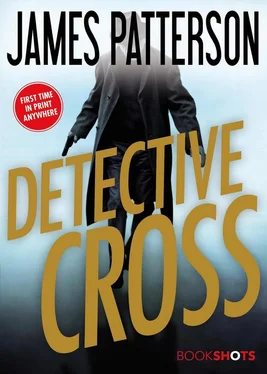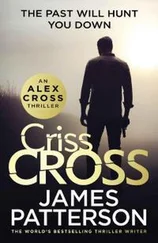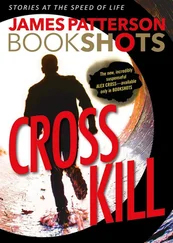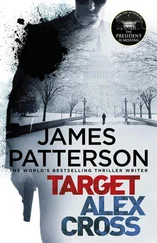“Your wife saw him dismantle a Glock in under thirty seconds,” Mahoney said.
“Once it’s unloaded, a gun’s no threat. Building a bomb, you can cross wires and blow yourself to kingdom come. Besides, you heard him, he’s got an alibi.”
“Bree’s checking it.”
“Doc,” Chorey moaned in the interrogation room. “I need some help.”
“I’d like to get him to a detox,” I said.
“Not happening until we get a firm—”
The observation booth door opened. Bree came in.
“The supervisor at the Central Union Mission vouches for him,” she said. “Chorey slept there last night, and left with the other men at 7:30. The super remembered because he tried to convince Chorey to stay for services, but Chorey said he had to go make a protest.”
Mahoney said, “So what? He leaves the mission, picks up pre-made bombs, goes to the Mall, and—”
“The timing’s wrong, Ned,” Bree insisted. “The bomber called me at 7:26 and again at 7:28, after he’d planted the bombs. The Mission supervisor said he was with Chorey between 7:20 and 7:30. During that time Chorey never asked for or used a phone, because he’s, well, deaf. He left the mission on foot.”
“The supervisor know about the gun?”
She nodded. “Chorey evidently turned it in whenever he came off the street to spend the night.”
In the interrogation room, Chorey rocked in his chair. “C’mon. Please, Doc. I got the sickness, man. The creepy-crawly sickness.”
“He’s not your bomber,” I said.
“He could be a diversion,” Mahoney said. “Part of the conspiracy. Besides, he had a loaded weapon in a national park, which is a federal offense. The Park Police will want him for that.”
“The Park Police can get him for that once he’s dry. They’ll know exactly where he is, should they decide to press charges. Or you can send him to the federal holding facility in Alexandria, which is ill-equipped to handle someone with advanced delirium tremens, and you risk him dying before he can get clean.”
The FBI agent squinted one eye at me. “You should have been a lawyer, Alex.”
“Just my professional opinion on a vet who has had a tough go of things.”
Mahoney hesitated, but then said, “Take him to rehab.”
“Thanks, Ned,” I said, and shook his hand.
Mahoney shook Bree’s hand, too, saying, “Before I forget, Chief Stone, you impressed a lot of people this morning. Word’s gotten around how cool you were under pressure.”
She looked uncomfortable at the praise and gestured at me. “You live long enough with this man and his grandmother, you can handle anything thrown your way.”
He laughed. “I can see that. Especially with Nana Mama.”
Bree and I lingered in the hallway. She was returning to DC Metro headquarters to brief Chief Michaels, and to buy a second phone.
“I’m proud of you, too,” I said, and kissed her.
“Thanks. I just wish we’d been able to get the mats on that second bomb before... it will be interesting to see if it was a radio-controlled detonation.”
“I’m sure Quantico’s on it.”
“See you at dinner?” she said, as I went back to the interrogation room door. “Nana Mama said she’s creating a masterpiece.”
“How could I miss that?”
Bree blew me a kiss, turned, and walked away.
I watched her go for a moment, more in love than ever. Then I turned the door handle and went inside, where retired Marine Gunnery Officer Tim Chorey continued to suffer for his country.
I got home around seven to find Bree sitting on the front porch, looking as frazzled as I felt.
“Welcome home,” she said, raising a mug. “Want a beer?”
I sat down beside her and said, “Half a glass.”
She set the mug down, reached down by her side and came up with a second mug and a growler from Blue Jacket, a new brewery in a formerly industrial area in southwest DC.
“Goldfinch,” Bree said. “A Belgian blond ale. It’s good. Nana bought it.”
She poured me half a mug and I sipped it, loving the cold, almost lemony flavor. “Hey, that is good.”
We sat in silence for several minutes, listening to the street, and to the rattle of kitchen utensils from inside.
“Tough day all around,” Bree said.
“Especially for you,” I said, and reached out my hand.
She took it and smiled. “This is enough.”
I smiled and said, “It is, isn’t it?”
“All I could want.”
I focused on that. Not on the memories of how sick poor Chorey had gotten before I could get him admitted into the detox unit. How he’d refused to wear the hearing device or read my words after a while, retreating from the world and what it had done to him in the surest way he knew how.
“Dinner!” Nana Mama called.
Bree squeezed my hand, and we went inside. My ninety-something grandmother was making magic at the stove when we entered the kitchen.
“Whatever it is, it smells great,” I said, thinking there was curry involved.
“It always smells great when Nana Mama’s manning the stove,” said Jannie, my sixteen-year-old daughter, as she carried covered dishes from the counter to the table.
“Smells weird to me,” said Ali, my almost nine-year-old, who was already sitting at the table, studying an iPad. “Is it tofu? I hate tofu.”
“As you’ve told me every day since the last time we had it,” my grandmother said.
“Is it?”
“Not even close,” she said, pushing her glasses up her nose on the way to the table. “No electronic devices at the dinner table, young man.”
Ali groaned. “It’s not a game, Nana. It’s homework.”
“And this is dinnertime,” I said.
He sighed, closed the cover, and put the tablet on a shelf behind him.
“Good,” Nana Mama said, smiling. “A little drumroll, please?”
Jannie started tapping her fingers against the tabletop. I joined in, and so did Bree and Ali.
“ Top Chef judges,” my grandmother said. “I give you fresh Alaskan halibut in a sauce of sweet onions, elephant garlic, Belgian blond beer, and dashes of cumin, cilantro, and curry.”
She popped off the lid. Sumptuous odors steamed out and swept my mind off my day. As we scooped jasmine rice and ladled the halibut onto our plates, I could tell Bree had managed to put her day aside as well.
The halibut was delicious, and Nana Mama’s delicate sauce made it all the better. I had seconds. So did everyone else.
The fuller I got, however, the more my thoughts drifted back to Chorey. Those thoughts must have shown on my face. My grandmother said, “Something not right with your meal, Alex?”
“No, ma’am,” I said. “I’d order that dish in a fancy restaurant.”
“Then what? Your trial?”
I refused to give that a second thought. I said, “No, there was this veteran Bree and I dealt with today. He suffered a head injury and lost most of his hearing in an explosion in Afghanistan. He lives in shelters and on the streets now.”
Ali said, “Dad, why does America treat its combat veterans so poorly?”
“We do not,” Jannie said.
“Yes, we do,” Ali said. “I read it on the Internet.”
“Don’t take everything on the Internet as gospel truth,” Nana Mama said.
“No,” he insisted. “There’s like a really high suicide rate when they come home.”
“That’s true,” Bree said.
Ali said, “And a lot of them live through getting blown up but they’re never right again. And their families have to take care of them, and they don’t know how.”
“I’ve heard that, too,” my grandmother said.
“There’s help for them, but not enough, given what they’ve been through,” I said. “We brought the guy today to the VA hospital. Took a while, but they got him in detox to get clean. The problem is what’s going to happen when he’s discharged.”
Читать дальше












